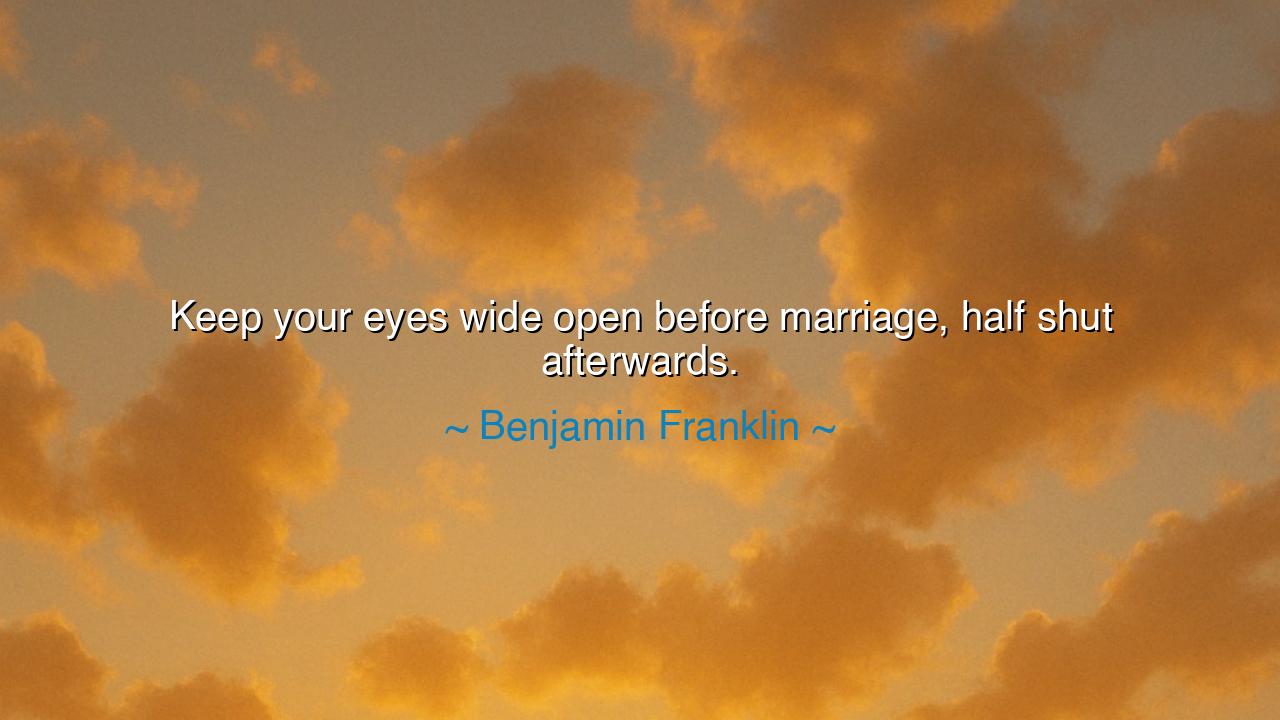
Keep your eyes wide open before marriage, half shut afterwards.






The words of Benjamin Franklin—“Keep your eyes wide open before marriage, half shut afterwards.”—are as sharp as they are wise. With his trademark wit, Franklin distills into a single sentence the art of discernment and forgiveness that sustains human love. His saying, though clothed in humor, carries the weight of timeless truth: that before marriage, one must look clearly and judge wisely, but after marriage, one must look gently and forgive freely. It is not a jest against love, but a celebration of its maturity—the understanding that wisdom in partnership lies first in caution, and then in grace.
The origin of this quote is found in Franklin’s collection of proverbs and maxims known as Poor Richard’s Almanack, first published in the 18th century. There, Franklin offered practical guidance on virtue, work, and domestic life, blending reason with wit to reach the common mind. In an age when marriage was both a social duty and a personal adventure, Franklin saw how easily passion could cloud judgment. Thus, he warned his readers to choose with open eyes—to see clearly the nature, habits, and character of the one they would bind their lives to. Yet, having made the choice, he counseled them to live with half-shut eyes, not from blindness, but from love’s higher sight: the willingness to overlook faults for the sake of peace and harmony.
In the first part of the saying—“Keep your eyes wide open before marriage”—Franklin speaks to prudence. Love is a fire that can dazzle the eyes; it can make virtues glow brighter and hide vices in shadow. He teaches that before taking vows, one must see the other as they truly are, not as imagination paints them. The wise look beyond beauty and charm to character and constancy. For, as the ancients said, “He who weds in haste repents at leisure.” Franklin, ever the pragmatist, reminds us that love without discernment is folly, and discernment without love is coldness. Both must meet before two lives are joined.
The second part—“half shut afterwards”—is the gentler half of wisdom. Once the bond is made, perfection must no longer be demanded. For marriage is not a transaction of flawlessness, but a covenant of endurance. Even the most virtuous companion will stumble, and even the most patient heart will err. To live happily, one must learn the art of selective sight—to see not every fault, nor hear every careless word, but to let small things pass as the wind through trees. Franklin knew that no marriage survives without mercy. Thus, the eyes that were sharp before must become kind after; judgment must give way to compassion, and vigilance to peace.
Consider the example of John and Abigail Adams, whose letters remain among the most beautiful records of love in history. John, often away in the service of his country, was headstrong and quick-tempered; Abigail, steadfast yet candid, often corrected his pride with wit and grace. Their marriage endured because each saw the other’s faults and yet chose to forgive. “My dearest friend,” she called him still, even when she disagreed. They practiced what Franklin preached: clear eyes before, gentle hearts after. Their union, tested by distance and politics, endured because it was built not on illusion, but on understanding and patience.
Franklin’s wisdom speaks beyond marriage itself—it speaks to all relationships that endure the trials of time. In friendship, family, and society, the same principle applies: first see clearly, then love kindly. The world is full of those who enter bonds without foresight and then destroy them through intolerance. The wise learn that happiness does not depend on perfection, but on forgiveness freely given and imperfections kindly endured. To live in harmony, one must not demand purity from others, but cultivate gentleness within oneself.
And so, my child, let this be your guide: look with reason before you love, and with mercy after you do. When you stand at love’s beginning, use both eyes to see truth; when you stand within it, use half, and let the other close in tenderness. Do not be blind, but be kind. Remember that marriage, like all human unions, is not a garden free of weeds but a field where patience must grow daily. Water it with understanding, and it will bloom even amid imperfection.
Thus, Benjamin Franklin’s jest becomes a teaching of the ages—a map for the heart that seeks both wisdom and joy. He reminds us that love, when seen rightly, is not the reward of those who find perfection, but the grace given to those who forgive it.






AAdministratorAdministrator
Welcome, honored guests. Please leave a comment, we will respond soon